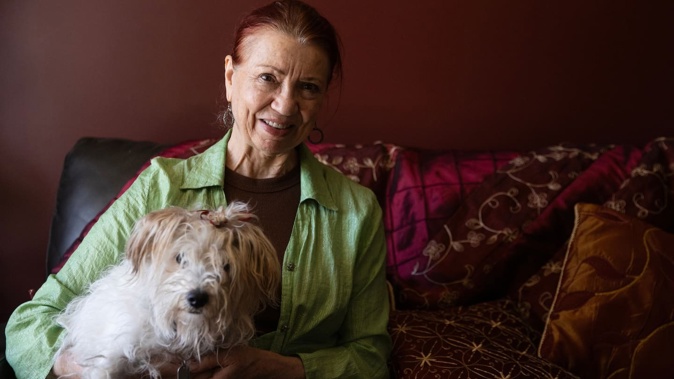
In the lead-up to Sheila Hailstone’s cancer diagnosis, months before she even noticed a breast lump herself, her dog, Plum had been behaving “out of character”.
One year later, Hailstone was fighting the biggest battle of her life.
Hailstone had always had regular mammograms. 2010 was no different.
Except this time, something was off.
Months before she got checked and far before noticing any lump herself, her dog, Plum started behaving strangely.
“She would jump on top of me, and she just started licking my breast, in exactly that place, strangely enough,” Hailstone said.
Plum is a 15-year-old Jack Russell Terrier. Despite the fact she never leaves her side, Hailstone thought her behaviour was “out of character”.
“She’d never done that before. It was really, really odd.”
A month later, Hailstone noticed a small bump in her breast, in the exact spot Plum had been pestering. She saw her doctor immediately.
“Unfortunately for me, the mammogram at the time didn’t pick it up,” she said.
Hailstone had two mammograms which both came back clear. But she knew something was wrong. Her doctors then put her through an ultrasound.
“The lump was then obvious,” she said.
Plum had been behaving “out of character” before Sheila Hailstone found any lump. Photo / George Heard
On February 14, Valentine’s Day 2011, Hailstone was told she had triple-positive breast cancer.
“There certainly was nothing romantic about that day,” she said.
Eight days later, Hailstone was having a mastectomy - not long after that on February 22, the Christchurch earthquakes hit.
Hailstone found herself in a home with three walls, staring down the barrel of her biggest battle yet.
“I was then living in a rental property and having chemotherapy and repairing my body at the same time,” she said.
Hailstone discovered, “too late”, that mammograms at that time didn’t pick up all cancers. Plum had been trying to tell her for months.
“If only she could speak,” she said.
Hailstone’s story is not the first.
Dogs’ senses are already being utilised as a medical tool in the early detection of cancer, and New Zealand is at the forefront of this research.
Dunedin-based research trust, K9 Medical Detection NZ, has a team dedicated to training dogs to detect bowel and ovarian cancer.
Founder Pauline Bloomfield was delighted to hear of Hailstone’s story, but she wasn’t surprised.
“The success we’ve had has shown that our methodologies are correct… dogs can detect the odour that’s released from the diseased cells,” she said.
It comes as the future of cancer detection recently leapt forward - when their trained labradors Hero and Hogan, achieved 100% success rates in advanced testing.
 Medical Detection NZ dog Hero, 2, smelling samples at the K9 NZ centre in Dunedin. Photo / K9 Medical Detection NZ
Medical Detection NZ dog Hero, 2, smelling samples at the K9 NZ centre in Dunedin. Photo / K9 Medical Detection NZ
“We are one step closer to offering non-invasive diagnostic options that could improve cancer outcomes for New Zealanders,” Bloomfield said.
“By training dogs to detect these specific odours it is possible to minimise the spread of the disease and identify at-risk patients sooner. This enables earlier commencement of treatment, potentially leading to improved patient outcomes.”
Similar to drug detection, Bloomfield said the dogs love the process, treating it like a game for which they’re rewarded.
Medical detection dogs, such as Hero, are trained to identify volatile organic compounds which are released from tumours present in medical conditions, such as cancer.
“We’re simply harnessing that natural ability dogs already have, we work with scientists throughout the process,” Bloomfield said.
Sheila Hailstone credits her survival to both her dog and her doctors. She has since written a book, Dancing Around Cancer, which outlines her journey. All proceeds from her book will go towards cancer research.
“I thought if I could try and raise $20,000 I would need to encourage 100 other women, or anybody who’s been through the same journey as me, to do the same, and then we could give $2 million... that would be one way of giving $2 million to cancer research,” she said.
Katie Oliver is a Christchurch-based Multimedia Journalist and breaking news reporter.
Take your Radio, Podcasts and Music with you









